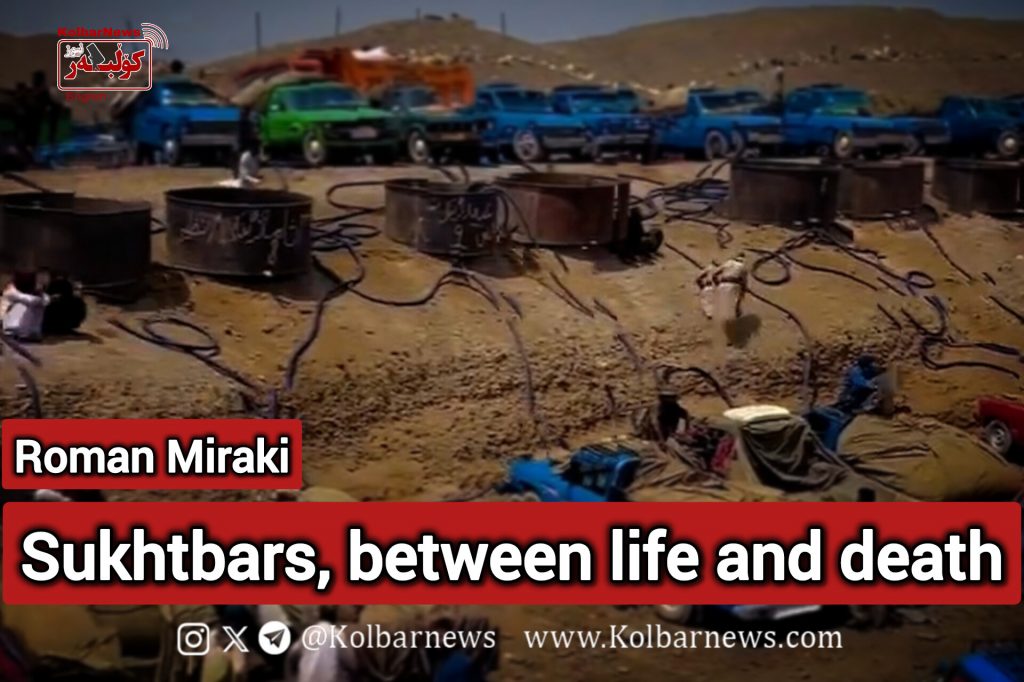Writer: Roman Miraki
In Balochistan, sukhtbars are a marginalized community caught in a web of systematic oppression and violence. For many of them, transporting fuel is not a choice, it is a means of survival in the face of widespread poverty and deprivation.

Sukhtbari: Representation of class oppression in Balochistan
Cultural and economic subjugation by an internal colonial regime has systematically eroded the capacity of the Baloch community for economic survival. While it is impossible to ignore the national oppression and religious discrimination experienced by the Baloch people, how they have been historically marginalized and neglected, facing systematic barriers to political representation, economic opportunities, and cultural recognition, the Baloch people, despite sharing common experiences of oppression and systematic erosion, have diverse economic, cultural, social, and class structures, each with its own demographic context and structure. This diversity challenges the notion of Baloch society as a homogeneous group, highlights the complexity of social relations within Balochistan, and warns against oversimplifying Baloch society as a monolithic entity.
Sukhtbars is a dangerous and precarious occupation carried out of economic necessity, and sukhtbar workers are pawns in the intersecting forces of oppression and death politics, which are the intersection of political power, systemic violence, and the vulnerability of minority and securitized communities. This form of exploitation traps the marginalized Baloch community in a cycle of further poverty and vulnerability, condemning them to a life like the walking dead; it demonstrates how the regime uses state authority to justify targeting marginalized individuals like sukhtbar workers. Often identified as “smugglers” and perceived as a threat to national security, these individuals are subjected to violence.
The massacre of sukhtbars in Shamsar
On February 22, 2021, the largest massacre of sukhtbars occurred. Baloch sukhtbars had been waiting for several days to be allowed to pass through the border gate. Military forces stationed at Shamsar checkpoint suddenly opened fire on them, injuring and killing dozens. Amnesty International called the massacre of sukhtbars a gross violation of the rights of the Baloch people and sukhtbars in a statement.
Even animals are not immune to widespread government violence. On February 14, 2023, hundreds of donkeys were killed by Pasdaran forces in the Kalegan border region under the pretext of fuel smuggling.
Baloch Kolbars: Rewards for a Bite of Bread
The spread of poverty has caused some people who cannot even afford a car or motorcycle to sukhtbari, to carry gallons of fuel on their backs, like the kolbars in Kurdistan, and cross the border.
Sistan and Baluchestan is one of the most deprived provinces in Iran in terms of poverty, unemployment, lack of healthcare facilities, educational and training facilities, transportation, and other facilities.
This deprivation has been imposed on Baloch citizens not only in Sistan and Baluchestan but also in South Khorasan, South Kerman, and East Hormozgan since the 1979 revolution.
Baloch kolbars, like sukhtbars, have resorted to this work and false jobs out of compulsion to earn a living for their families: Baloch kolbars are active at border crossings, border terminals, and customs offices, transporting goods and gallons of fuel in these areas. In recent years, in many areas of Balochistan, there have also been kolbars at checkpoints, where Baloch citizens would transport gallons of fuel from behind the checkpoints to the other side of the checkpoint.
Baloch kolbars used to be active at the border crossings of the former cities of Rimdan, Kohak, and the Milak border in Mirjaveh, and now Baloch citizens are rarely engaged in kolbar work at some border crossings, such as the Milak border terminal.
Many sukhtbar workers are children under 15 who travel long distances carrying gallons of fuel: “They have been beaten many times by border guards. These children have been forced to do this hard and dangerous work to help support their families”.
Baloch kolbars, who were transporting 20-liter gallons of fuel through border crossings, were beaten, insulted, and insulted by the Islamic Republic’s border guards, and a number of kolbars were even detained by military forces for hours and days.
There are no statistics on the number of sukhtbars, and the number of Baloch kolbars has not yet been estimated: “Kolbars and Sukhtbars are not the choice of any Baloch citizen, but since the imposed poverty has prevailed by the Islamic Republic, citizens are forced to turn to this false work.
It is the government that kills Sukhtbars
The Iranian government’s deliberate inaction and refusal to provide relief to the flood victims of Balochistan is also a form of death politics, in which the government uses its authority to determine who is worthy of support and who is expendable. By prioritizing political agendas, the government, due to the coincidence of the general elections for the parliament with the flood disaster in Balochistan, is sending a clear message by sending ballot boxes instead of relief supplies to the flood victims: political processes and maintaining power take precedence over the immediate needs of the oppressed people.
Two tragedies in the history of Balochistan in recent years have further exposed the government’s policy of Balochicide and the killing of sukhtbars; first, a natural disaster that turned into a human tragedy due to the government’s negligence, and second, their murder without any cover-up.
In August 2023, a major and devastating flood occurred in the village of Pirkor, a part of Rask City. Many sukhtbars were trapped in the floodwaters, but the government refused to save them. The government, deliberately ignoring the Baloch, did not even send rescue dogs and cranes to the flooded area.

